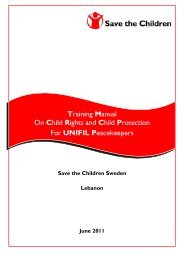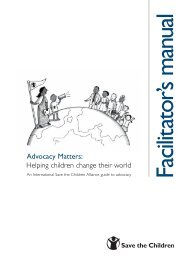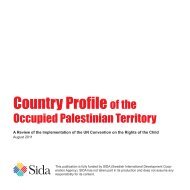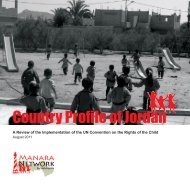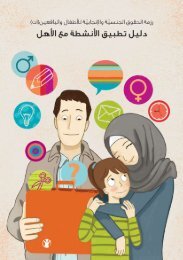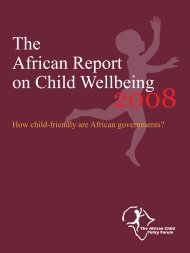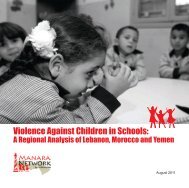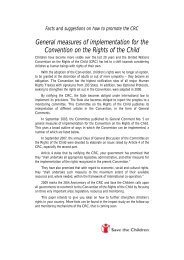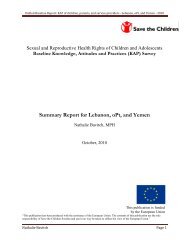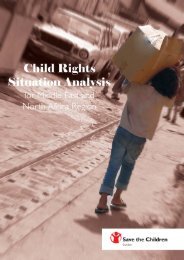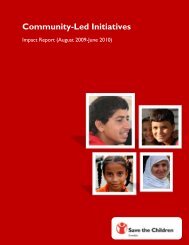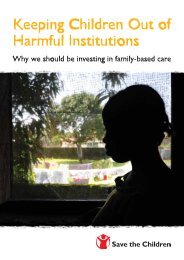Country Profile of Morocco - International Bureau of Children's Rights
Country Profile of Morocco - International Bureau of Children's Rights
Country Profile of Morocco - International Bureau of Children's Rights
Create successful ePaper yourself
Turn your PDF publications into a flip-book with our unique Google optimized e-Paper software.
Introduction<br />
Bayti Association<br />
This country pr<strong>of</strong>ile was written by Bayti Association, a<br />
Moroccan organisation founded in 1995 for the promotion<br />
<strong>of</strong> children’s rights. ‘Bayti’ in Arabic means ‘my home’<br />
and the organisation <strong>of</strong> the same name began its work<br />
with children in the streets, expanding to serve children<br />
living in difficult circumstances.<br />
Bayti Association has three main programmes that help<br />
these children by giving them the tools, with the support<br />
<strong>of</strong> educators, to establish a new life.<br />
Since 2008, Bayti has had a Training and Expertise Department<br />
that shares its knowledge and expertise in the<br />
field <strong>of</strong> childhood development and support for children<br />
living in the streets and in difficult circumstances.<br />
Through this department, Bayti Association supports<br />
several Moroccan and foreign organisations working with<br />
children, training their educators and developing rightsbased<br />
programmes.<br />
The <strong>International</strong> <strong>Bureau</strong> for Children’s <strong>Rights</strong><br />
Created in 1994 and based in Montreal, Canada, the<br />
<strong>International</strong> <strong>Bureau</strong> for Children’s <strong>Rights</strong> (IBCR) is an<br />
international nongovernmental organisation (INGO)<br />
with special consultative status with the United Nations<br />
Economic and Social Council (ECOSOC). IBCR <strong>of</strong>fers its<br />
expertise, particularly in the legal sector, for the protection<br />
and promotion <strong>of</strong> children’s rights in conformity with the<br />
1989 United Nations Convention on the <strong>Rights</strong> <strong>of</strong> the<br />
Child (CRC) and its Optional Protocols. IBCR is involved<br />
in projects around the world to facilitate the sharing <strong>of</strong><br />
9<br />
knowledge and good practices and the development <strong>of</strong><br />
tools and models to inspire implementation <strong>of</strong> children’s<br />
rights. IBCR’s expertise also lies in raising awareness about<br />
children’s rights to persuade decision-makers to adopt<br />
laws and programmes that more effectively respect the<br />
rights <strong>of</strong> the child. In recent years, IBCR’s main successes<br />
include its contribution to the elaboration <strong>of</strong> the Guidelines<br />
on Justice in Matters Involving Children Victims<br />
and Witnesses <strong>of</strong> Crime as well as their adoption by the<br />
United Nations Economic and Social Council. IBCR<br />
worked with Save the Children Sweden and the various<br />
country partners to produce the following country pr<strong>of</strong>ile.<br />
Save the Children Sweden<br />
Save the Children Sweden was established in 1919 as an<br />
independent rights-based non-governmental organisation<br />
(NGO) with no religious or political affiliations. The<br />
basis <strong>of</strong> its work is the United Nations Convention on the<br />
<strong>Rights</strong> <strong>of</strong> the Child (CRC) and the United Nations’ Declaration<br />
on Human <strong>Rights</strong>. These build on the principles<br />
that all people are equal, children have special rights and<br />
everyone has a responsibility—but governments have a<br />
special obligation. We believe that children themselves can<br />
also fight for their rights, if they are given the chance to<br />
do so and if they receive support and encouragement.<br />
Save the Children Sweden works both in Sweden and<br />
in eight regions around the world, carrying out its own<br />
programmes and in cooperation with other organisations.<br />
It is also part <strong>of</strong> Save the Children <strong>International</strong>, comprised<br />
<strong>of</strong> 27 Save the Children organisations. Save the<br />
Children’s vision is a world in which every child attains the<br />
right to survival, protection, development and participation.<br />
Its mission is to inspire breakthroughs in the way the<br />
world treats children, and to achieve immediate and lasting<br />
change in their lives.




